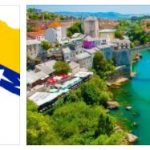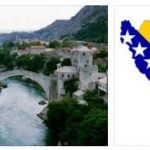Bosnia and Herzegovina: United and Split at the Same Time Part III
NATO’s military intervention was followed by strong political pressure from the United States. They gathered representatives of the warring parties – also from neighboring Croatia and Serbia – for negotiations at a military airport in Dayton (USA). After two weeks of fierce negotiations, they reached an agreement – the so-called Dayton agreement in November 1995. The agreement meant that the state of Bosnia and Herzegovina would exist, but that the country would be divided into two roughly equal units that had extensive autonomy (autonomy). .
- Republika Srpska. In this unit it was implied that the Serbs should be in the majority
- The Federation. In this unit, there should be most Bosniaks and Croats. In order for the Croats not to be dominated by the far more Bosniaks, the Federation was also divided into 10 cantons (much like the county in Norway).
7: A unique stat
The Dayton Accords created a state that could not be found in the whole world. There are in practice 14 governments in the country, and this makes sensible governance almost impossible. According to PHYSICSCAT, Bosnians are constantly arguing about who has the right to decide what. But in addition to local politicians, Bosnia has in practice been ruled by foreign bureaucrats and politicians since 1996. Under the Dayton Accords , an international High Representative was created , who was given the power to depose any politician and bureaucrat, and adopt or put out of force a law. Especially until 2005, the Conservative Party used its great power quite often. First and foremost, it is the Conservative Party’s presence that makes some Bosnians believe that the country is not an independent state.
Hardly anyone was satisfied with the state on which the Dayton Accords were based. The Bosniaks wanted a stronger and more centralized state, the Serbs wanted to largely break away from the rest of Bosnia and the Croats wanted their own unity – without the Bosniaks. Western countries and the Conservative Party were mostly on the side of the Bosniaks – they also wanted a stronger state. To achieve this, one entices with EU and NATO membership. But for Bosnia to achieve such membership, the country had to make certain changes to the constitution. And there have
been reforms and changes in Bosnia since 1995. More power has been transferred to the central level, among other things, they have got a common army, intelligence service, tax collection, common currency, central bank and others.
8: Bosnia hangs on
However, the political strife and vocabulary are still sharp, marked by harsh outbursts against “the others” . In the main, the voters vote by ethnicity . There are Serbian, Croatian and Bosnian parties, but almost none that actually have a multi-ethnic appeal, ie a party with support in several ethnic − religious camps. We also see that the ethnic cleansing has not been reversed to any great extent.
Although people under the Dayton Accords had the right to move back to where they lived before the war, very few have done so. They prefer area where their own ethnic group is already in the majority. The war has therefore led to Bosnia no longer being an ethnic patchwork quilt . Rather, there is the large, contiguous area that is either Serbian, Croatian or Bosnian.
It also means that schools and the local community have a different character, people no longer grow up together with people with other religions. In schools, it becomes difficult to operate according to common curricula for the whole country. In the different units, different versions of history are taught, and the languages they use also become more different. It does not appear at all that people living in Bosnia are growing closer to each other. Rather, development is going in the opposite direction.
It is difficult to say what will happen in Bosnia in the years to come. There are still those who are afraid that a new civil war will arise, perhaps as a result of the Serbs in Bosnia taking their threat of secession seriously. There are also many frustrated young men who have neither a job nor good prospects for the future – a germ of social unrest and a danger to a quarter of society. It hardly gets better when the economic situation is miserable and the politicians after the election in 2010 spent over a year establishing a new government.
Another persistent boil in Bosnia has our people who are wanted for war crimes and the question of bringing these to court: Karadzic, Mladic, Ganic and others. In this field, however, it seems to have loosened since the central ones have been handed over to the International Criminal Tribunal for the former Yugoslavia (ICTY) – the Yugoslav court – in The Hague.
At the same time, the world has changed, and so have the people of Bosnia. Many people remember how bad they were during the war and naturally want peace (war fatigue). The EU is trying to take a bigger role in Bosnia and is pushing for reforms. It therefore seems most likely that the current political system can hang in the balance for a few more years. No one is satisfied – it is expensive to run all the overlapping public agencies, people vote for ethnic parties – but at least it is not war. And that is perhaps the most important thing one has achieved with the Dayton agreement. People are no longer killed by bullets and grenades.













